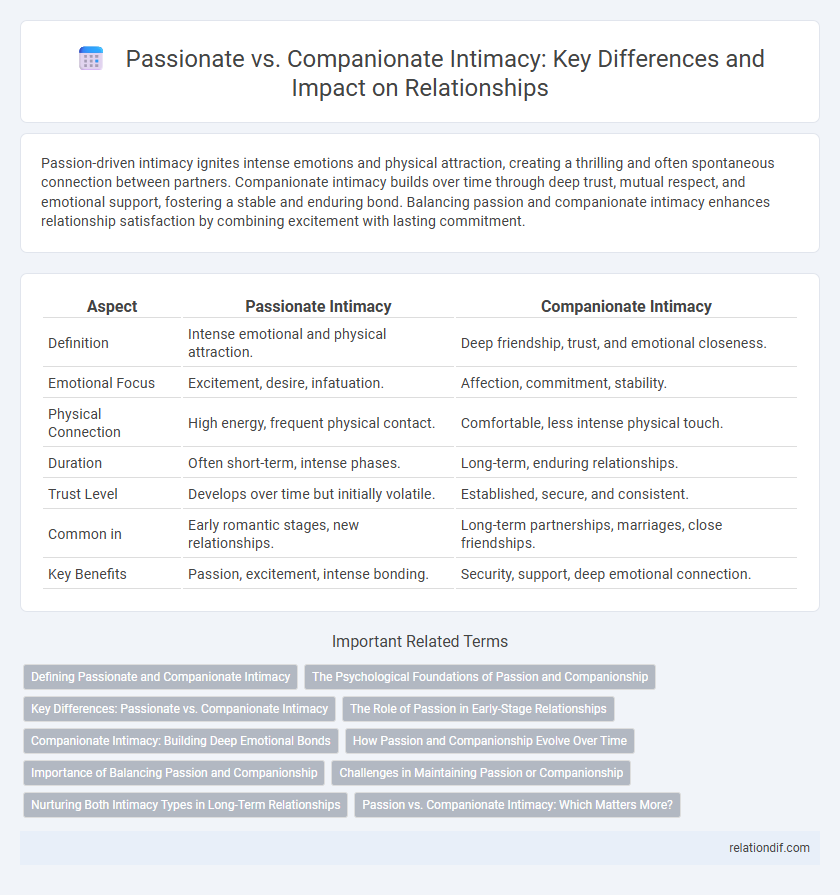Passion-driven intimacy ignites intense emotions and physical attraction, creating a thrilling and often spontaneous connection between partners. Companionate intimacy builds over time through deep trust, mutual respect, and emotional support, fostering a stable and enduring bond. Balancing passion and companionate intimacy enhances relationship satisfaction by combining excitement with lasting commitment.
Table of Comparison
| Aspect | Passionate Intimacy | Companionate Intimacy |
|---|---|---|
| Definition | Intense emotional and physical attraction. | Deep friendship, trust, and emotional closeness. |
| Emotional Focus | Excitement, desire, infatuation. | Affection, commitment, stability. |
| Physical Connection | High energy, frequent physical contact. | Comfortable, less intense physical touch. |
| Duration | Often short-term, intense phases. | Long-term, enduring relationships. |
| Trust Level | Develops over time but initially volatile. | Established, secure, and consistent. |
| Common in | Early romantic stages, new relationships. | Long-term partnerships, marriages, close friendships. |
| Key Benefits | Passion, excitement, intense bonding. | Security, support, deep emotional connection. |
Defining Passionate and Companionate Intimacy
Passionate intimacy is characterized by intense emotions, physical attraction, and a strong desire for closeness, often marked by excitement and longing. Companionate intimacy centers around deep affection, trust, and a profound sense of connection built on friendship and mutual respect. Both forms contribute uniquely to relationship satisfaction, with passion fueling romantic intensity and companionship providing stability and enduring emotional support.
The Psychological Foundations of Passion and Companionship
Passion-driven intimacy originates from intense emotional arousal and desire, rooted in dopamine and norepinephrine activity that fuels attraction and excitement. Companionate intimacy is grounded in oxytocin and serotonin, promoting emotional security, trust, and deep bonding over time. The psychological foundations reveal that passion often sparks initial connection, while companionate intimacy sustains long-term relational stability and satisfaction.
Key Differences: Passionate vs. Companionate Intimacy
Passionate intimacy is characterized by intense emotions, physical attraction, and a powerful desire for connection, often igniting the initial stages of a romantic relationship. Companionate intimacy develops over time, emphasizing deep emotional bonds, mutual respect, and long-term commitment without the overwhelming physical intensity. Understanding the key differences between passionate and companionate intimacy helps couples balance excitement with enduring closeness for sustained relationship satisfaction.
The Role of Passion in Early-Stage Relationships
Passion in early-stage relationships drives intense physical attraction and emotional excitement, essential for forming initial romantic bonds. This fiery enthusiasm often stimulates dopamine release, reinforcing connection and desire between partners. While companionate intimacy grows through shared experiences and deep trust, passion ignites the relationship's foundation by fostering urgency and emotional intensity.
Companionate Intimacy: Building Deep Emotional Bonds
Companionate intimacy centers on cultivating profound emotional connections characterized by trust, mutual respect, and shared experiences that strengthen relationship stability. Unlike passion-driven intimacy, it emphasizes long-term commitment, empathy, and deep understanding, fostering a secure and supportive partnership. Research indicates that companionate intimacy contributes significantly to relationship satisfaction and resilience over time.
How Passion and Companionship Evolve Over Time
Passion in intimate relationships often ignites quickly, fueled by intense attraction and emotional arousal, but it typically peaks within the first few years. Companionate intimacy, characterized by deep affection, trust, and mutual respect, gradually strengthens as partners share experiences and build a stable emotional connection. Over time, successful relationships tend to transition from passionate intensity to enduring companionship, where emotional support and commitment sustain the bond.
Importance of Balancing Passion and Companionship
Balancing passion and companionate intimacy is crucial for sustaining a healthy and fulfilling relationship, as passion fuels desire and excitement while companionship fosters trust and emotional security. Studies show that couples who maintain both elements experience higher relationship satisfaction and resilience over time. Prioritizing mutual understanding and consistent emotional support enhances the dynamic interplay between these forms of intimacy, creating long-term connection and fulfillment.
Challenges in Maintaining Passion or Companionship
Passion in intimacy often requires continuous excitement and novelty, yet sustaining intense desire can be challenging due to routine and external stressors. Companionate intimacy relies on deep emotional connection and trust, which may face difficulties from communication breakdowns or evolving individual needs. Balancing passion's intensity with companionship's stability is essential to overcome these challenges and nurture a lasting intimate relationship.
Nurturing Both Intimacy Types in Long-Term Relationships
Balancing passion and companionate intimacy is essential for sustaining long-term relationships, as passion fuels desire while companionate intimacy fosters deep emotional connection and trust. Couples who actively nurture both types through open communication, shared experiences, and physical affection often report higher relationship satisfaction and resilience. Prioritizing both excitement and emotional support creates a harmonious partnership that evolves with time.
Passion vs. Companionate Intimacy: Which Matters More?
Passion intimacy, characterized by intense emotions and physical attraction, ignites relationships with energy and excitement. Companionate intimacy, grounded in deep friendship, trust, and mutual respect, fosters long-term stability and emotional security. Research suggests while passion sparks initial connection, companionate intimacy sustains lasting relationships through enduring commitment and shared life experiences.
passion vs companionate intimacy Infographic

 relationdif.com
relationdif.com